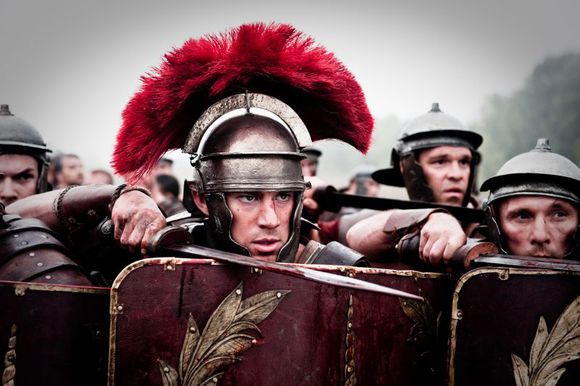The telltale sign of the crisis of the third century AD was the thirty odd emperors and some were odd indeed who claimed the imperator in the half century before 284 when the emperor Diocletian restored order for good.
這一危機(jī)的跡象就是三十多位奇怪的皇帝,有些自稱為元首的也非常奇怪,這種現(xiàn)象持續(xù)了半個世紀(jì),直到公元284年戴克里先重建帝國。
Some of these emperors held office, two, three at a time.
有些皇帝在位僅僅兩到三年。
Some of these emperors stunk, and some were actually promising, most had risen from humble peasant status up to the rank of general and been proclaimed as imperator by their soldiers and again when the soldiers proclaimed a man imperator he had two choices; revolution or death.
有些皇帝臭名昭著,有些事實(shí)上很有前途,大多數(shù)都是卑微的農(nóng)民出身,經(jīng)過奮斗成為將軍后來被自己的士兵擁為元首,而一旦士兵將某人擁為元首,他就只有兩種選擇:要么革命,要么死去。

As the roman generals fought with each other the roman frontiers crumbled in all directions.
羅馬的將軍們互相作戰(zhàn)的時候,羅馬各處的邊界線也在崩潰。
From the north Gothic tribes invaded Gaul, Spain, and even Italy itself.
北部的哥特族部落入侵了高盧,西班牙,甚至是意大利。
In the east the Persians conquered Mesopotamia and Syria.
而在東部,波斯人征服了美索不達(dá)米亞和敘利亞。
Since the Roman armies in the area were too weak to do anything about the invaders
由于邊境地區(qū)的羅馬軍隊(duì)力量太過薄弱,對入侵者束手無策,
the emperor Dejou resorted to buying the barbarians off.
羅馬皇帝只能花錢買和。
Sometimes Roman provincial leaders seceded from the Roman Empire as did Posthumous in Gaul or they even established their own empire as Ordinadus in Zenobia did on the fringes of Western Syria.
有時羅馬的一些行省還會脫離羅馬帝國如高盧行省,他們甚至?xí)⑵鹱约旱牡蹏缥鲾⒗麃喌倪吘壍貐^(qū)。
At the same time plague swept wide areas of the empire bringing starvation and economic chaos along with it.
與此同時,羅馬帝國瘟疫肆虐造成災(zāi)荒嚴(yán)重,經(jīng)濟(jì)陷入混亂。
This made paying the soldiers and paying off the invaders even ore problematic and the economy continued its nosedive.
這使得給士兵支付軍餉,擊退入侵者就變得更加艱巨,經(jīng)濟(jì)也持續(xù)衰退。
The very richest Romans in the cities dodged their fair share by purchasing tax exemptions,
城里的富人通過購買免稅,逃避自己應(yīng)負(fù)的責(zé)任,
which helped the government in the short run but destroyed it in the long run.
這在短期內(nèi)幫助了政府,但從長期看來,卻毀滅了政府。
Other new sources of revenue included debasing the coinage,
其它的政府收入來源包括將貨幣貶值,
which caused inflation so bad that the government would not accept its own Roman money in payment of Roman taxes.
造成嚴(yán)重的通貨膨脹,以至于政府都不愿意接受以羅馬貨幣繳納的稅款。
This in turn made the tax burden fall even harder on those who could afford it least
這就使得納稅的重?fù)?dān)落到了那些交不起稅款的人身上,
what monies the cities could keep for themselves after paying the central government
各個城市交完稅款后剩下的錢,
went for walls and fortifications not social services.
也都用于修筑城墻和防御工事,而沒有用到社會服務(wù)中去。












